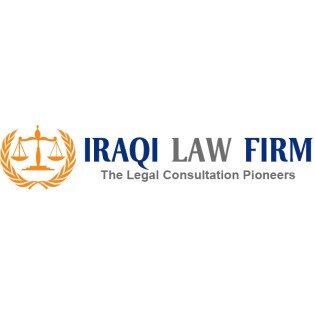Best Energy, Environment & ESG Lawyers in Iraq
Share your needs with us, get contacted by law firms.
Free. Takes 2 min.
Or refine your search by selecting a city:
List of the best lawyers in Iraq
About Energy, Environment & ESG Law in Iraq
Iraq is a country richly endowed with oil and gas resources, playing a crucial role in the global energy market. Alongside its booming energy sector, Iraq faces significant environmental challenges due to decades of conflict, infrastructure destruction, and rapid economic development. In recent years, the country has recognized the importance of Environmental, Social, and Governance (ESG) standards to promote sustainable growth and attract foreign investment.
Energy, Environment, and ESG law in Iraq encompass a wide range of regulations, contracts, and compliance requirements aimed at governing the exploration, extraction, production, and distribution of natural resources. These laws also address environmental protection, pollution control, and social responsibility, creating a complex legal framework that requires careful navigation for businesses and individuals alike.
Why You May Need a Lawyer
Legal matters related to Energy, Environment, and ESG in Iraq can be highly complex and often require specialized knowledge. You may need a lawyer in several common situations, including:
- Negotiating oil or gas exploration and production contracts with the government or private companies
- Navigating licensing procedures for energy projects
- Complying with local and international environmental regulations
- Defending against environmental liability claims
- Addressing land use or water rights disputes
- Managing ESG compliance to attract investors and meet international standards
- Responding to government inspections or enforcement actions
- Handling disputes related to joint ventures or foreign investments
- Ensuring community rights and stakeholder engagement requirements are met
- Drafting and reviewing environmental impact assessments and sustainability reports
Given the complex and evolving regulatory landscape, a qualified lawyer can provide you with tailored advice, represent your interests, and help you avoid costly mistakes.
Local Laws Overview
Key aspects of Iraq's legal framework for energy, environment, and ESG include:
- Oil and Gas Regulation: The Ministry of Oil manages the oil and gas sector, overseeing licensing rounds, production sharing agreements, and technical service contracts. The legal framework is governed primarily by national statutes, ministerial instructions, and model contracts. The Kurdistan Regional Government (KRG) has its own set of regional regulations for natural resource management.
- Environmental Protection Laws: Iraq's principal environmental legislation is Law No. 27 of 2009 on Environmental Protection and Improvement. It covers pollution controls, environmental permits, emissions standards, and environmental impact assessments. Authorities such as the Ministry of Environment set detailed rules and enforce compliance.
- ESG Compliance: ESG reporting is often driven by foreign investor requirements rather than local laws. However, the government increasingly emphasizes transparency, anti-corruption, labor rights, and environmental sustainability, especially in large public projects.
- International Treaties: Iraq is a signatory to several international conventions on climate, biodiversity, and water rights, such as the UN Framework Convention on Climate Change (UNFCCC).
- Dispute Resolution: Commercial disputes, including those in the energy sector, may be resolved in national courts or through arbitration, with many contracts specifying international arbitral institutions.
Companies and individuals must also be aware of evolving government policies, decentralization between federal and regional authorities, and the influence of international financial institutions on compliance expectations.
Frequently Asked Questions
What is the main law governing environmental protection in Iraq?
Law No. 27 of 2009 on Environmental Protection and Improvement is the primary piece of legislation governing environmental matters in Iraq.
Who regulates the oil and gas industry in Iraq?
The Ministry of Oil oversees the oil and gas sector at the federal level, while the Kurdistan Regional Government manages resources within the Kurdistan region.
Do I need an environmental permit to start an energy project?
Yes, most energy projects require environmental permits and may also need to undergo an environmental impact assessment before operations can begin.
What are common environmental risks in the Iraqi energy sector?
Frequent risks include oil spills, air pollution from flaring, improper hazardous waste disposal, and contamination of water resources.
Are there incentives for adopting ESG standards in Iraq?
Adopting ESG standards can make businesses more attractive to international investors and reduce regulatory risks, although direct government incentives are limited.
How are environmental disputes resolved in Iraq?
Environmental disputes can be brought before Iraqi courts or, if specified in contracts, may be settled through arbitration or mediation.
Is Iraq a party to global climate agreements?
Yes, Iraq is a party to the UN Framework Convention on Climate Change and other international environmental treaties.
What should I do if my company is accused of environmental violations?
You should consult a lawyer familiar with Iraqi law immediately to help navigate investigations, respond to government actions, and minimize penalties.
How can I ensure compliance with local and international ESG requirements?
Work with legal and compliance specialists to identify relevant laws, develop internal policies, and conduct regular audits and training.
Are foreign investors subject to the same environmental and energy laws as local companies?
Yes, foreign and local investors are generally subject to the same energy and environmental laws and regulations in Iraq.
Additional Resources
Consider consulting the following resources and organizations for more information:
- Ministry of Oil - Regularly publishes updates and guidelines for operators in the oil and gas sector
- Ministry of Environment - Provides information on environmental regulations, permits, and compliance procedures
- Iraq National Investment Commission - Offers insights on investment regulations, including ESG considerations
- United Nations Development Programme (UNDP) Iraq - Supports environmental programs and sustainable development initiatives
- Kurdistan Regional Government - Ministry of Natural Resources for region-specific laws and guidance
- Local bar associations and legal aid organizations
These bodies can provide guidance, regulatory updates, and assist in navigating the legal framework.
Next Steps
If you require legal assistance in the field of Energy, Environment, or ESG in Iraq, consider the following steps:
- Document your situation, including any relevant contracts, communications, or official correspondence
- Research and identify legal professionals or law firms with specialized experience in Iraqi energy and environmental law
- Schedule a consultation with a qualified lawyer to discuss your case and legal options
- Prepare a list of questions and concerns to address during your meeting
- Stay informed about changes in relevant laws, government policies, and best practices for compliance
- Engage with industry or professional associations to expand your understanding and network
By taking these steps, you can better protect your interests, ensure compliance with Iraqi laws, and address any challenges in the dynamic fields of energy, environment, and ESG.
Lawzana helps you find the best lawyers and law firms in Iraq through a curated and pre-screened list of qualified legal professionals. Our platform offers rankings and detailed profiles of attorneys and law firms, allowing you to compare based on practice areas, including Energy, Environment & ESG, experience, and client feedback.
Each profile includes a description of the firm's areas of practice, client reviews, team members and partners, year of establishment, spoken languages, office locations, contact information, social media presence, and any published articles or resources. Most firms on our platform speak English and are experienced in both local and international legal matters.
Get a quote from top-rated law firms in Iraq — quickly, securely, and without unnecessary hassle.
Disclaimer:
The information provided on this page is for general informational purposes only and does not constitute legal advice. While we strive to ensure the accuracy and relevance of the content, legal information may change over time, and interpretations of the law can vary. You should always consult with a qualified legal professional for advice specific to your situation.
We disclaim all liability for actions taken or not taken based on the content of this page. If you believe any information is incorrect or outdated, please contact us, and we will review and update it where appropriate.
Browse energy, environment & esg law firms by service in Iraq
Iraq Attorneys in related practice areas.
Browse energy, environment & esg law firms by city in Iraq
Refine your search by selecting a city.

















